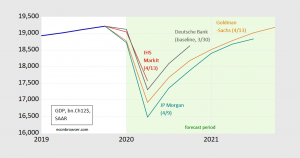It’s been interesting to me to see how various economic groups assess the outlook. Here are a select few:
While rapid growth is projected for the end of the year, it’s of interest to note that output will still be below the pre-Covid19 trajectory.
It must be an unenviable task to forecast output in these times. Thinking about it a bit, on top of the usual challenges, these forecasts have to be conditioned on big question marks (so known unknowns as well and unknown unknowns).
- Scientific unknowns about degree of contagiousness, whether there’s seasonality, the ease of reinfection
- Political unknowns such as commitment to developing an infrastructure to test, track the epidemic, so that the economy can be restarted without large increments to fatalities.
- Unknowns regarding how the health infrastructure has been degraded by the scattershot administrative response, thereby constraining the readiness for restart
- Unknowns regarding administrative capacity of a Federal government that has many policy level positions still vacant.
Update, 4/21:
A Vox article on the difficulties of forecasting, even w/o a pandemic, here.

“known unknowns as well and unknown unknowns”. What ever happened to Donald Rumsfeld?
“Political unknowns such as commitment to developing an infrastructure to test, track the epidemic, so that the economy can be restarted without large increments to fatalities”. This must be done at the Federal level but the Toddler in Chief refuses to lead here.
“Unknowns regarding administrative capacity of a Federal government that has many policy level positions still vacant”. But wait – under the leadership of Jared and Ivanka and all that wisdom from Dr. Kudlow, what could go wrong?
Being an outhouse economist instead of a real one might be an advantage about now. Not that any of those people even qualify for that title.
As a strictly amateur outhouse economist, my expectation is that every single one of those projections is optimistic.
Larry Summers gave a very good synopsis of some of what is going on in his talk on Noah Feldman’s ‘Deep Background’ podcast. https://pushkin.fm/deep-background He posits that the economy is losing $80B a week under the current closure conditions and that much more money should be spent on testing so that employees can be quickly monitored and hot spots of SARS-CoV-2 infection closed down. This is in accord with my own thinking. “If” we make the necessary investment in testing and it has to be 10-20 fold greater than what is currently possible I think things can start moving again. The lost to open will be restaurants, bars, and sporting events where there are close congregations of people. It’s likely malls and shops will require controlled entrance so that there is some type of ‘social distancing.’ It’s all achievable but as pgl notes above we cannot have ‘unknown unknowns.’ To answer his question, Rumsfeld is still around as far as I know (I had a friend from the pharma industry that worked for him at the Pentagon.)
Thanks for the Noah Feldman link. I’ve been a Noah Feldman fan for quite awhile, but somehow missed the fact he had his own podcast.
Everyone who gets it says testing is the key. Cuomo yesterday said New York needed Federal help to get that done here. Of course Trump wasn’t listening as he was too busy attacking people – as usual,
Dear Folks,
I don’t know what will happen with COVID-19 and the resulting effects on the economy. This just isn’t my specialty, because so much depends on the human interactions, and that depends on the policies, which are still highly uncertain. My worries about inflation are not to diminish the possibility of a loss in aggregate demand, but just to wonder if the loss in aggregate supply will be greater. Aggregate supply seems to be much harder to forecast.
But for those who believe they do have some insight, possibly Menzie, or Jim Hamilton, or AS, or others, Skema Business School and American University are organizing a workshop on the subject. The following is part of the announcement:
—–
First Virtual IIF Workshop on
“Economic Forecasting in Times of Covid-19”
July 6-7, 2020
The COVID-19 pandemic has triggered a massive spike in concerns and uncertainties and raised challenges in macroeconomic forecasting surrounding almost every aspect. The purpose of this virtual workshop is to bring together researchers working on various aspects of measurement, modelling, evaluation and forecasting of COVID and its impact on the economy. We envisage the workshop papers will address, among others, the following topics:
– Interaction between epidemics and economic decisions
– The spread of the virus and its global spillovers
– Measuring and forecasting the impact of the crisis on financial markets
– High-frequency economic monitoring in times of crisis
– Conducting fiscal/monetary policy in times of a pandemics
– Historical lessons from previous pandemics
– Quantification of concerns and uncertainties using news media
– Long-run economic consequences of pandemics
The scope of the workshop is not limited to the topics listed above and submissions from all areas of forecasting related to the Covid-19 crisis are welcome.
PAPER SUBMISSION PROCEDURE:
Please send full papers as a PDF to CovidForecasting@gmail.com.
WORKSHOP ORGANIZERS:
Laurent Ferrara, SKEMA Business School, laurent.ferrara@skema.edu
Xuguang Simon Sheng, American University, sheng@american.edu
—–
I am not acquainted with Laurent Ferrara, but am reasonably well-acquainted with Simon, and he is excellent. So if you have something, this could be a good place to send it to.
Julian
P.S. Those interested in what appears to be a non-technical account of the 1918 Flu may find
https://twitter.com/smpnonfiction/status/1247254082114539520/photo/1
which mentions Catharine Arnold, “Eyewitness Accounts from the Greatest Medical Holocaust in Modern History – Pandemic 1918”, St. Martin’s Press, St. Martin’s Publishing Group, 2018, ISBN: 9781250139436, 368 Pages, of value.